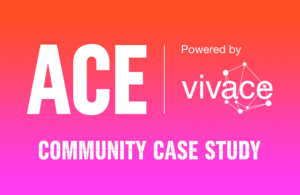Enabling change that matters: the Daintta ACE supplier story
How ACE provided the consultants with a platform for growth, the ability to showcase quality work and access to new customers they wouldn’t otherwise have met.

Technical and business consultancy Daintta was founded on the values of transparency, fairness and daring with a mission to put staff and customers first.
Starting with just three staff in 2020, it now has over 60 engineers and technical and business consultants as well as horizon scanning and innovation specialists. The company prides itself on having a diverse workforce as well as creating an environment that enables people to bring the best of themselves to work and thrive.
Daintta has been a member of the Vivace community since late 2020 and its core expertise areas are:
- digital intelligence, bringing disparate datasets together through capabilities such as data science, machine learning and artificial intelligence (AI) to enable greater insights
- cybersecurity and data privacy, helping companies become more resilient and
- networks and communication, helping organisations embrace new and emerging technologies
Navigating complexity
One thing that links much of Daintta’s work inside and outside the Accelerated Capability Environment (ACE) is complex project delivery says Abu Sayed, the company’s chief client officer.
He said: “Most of the work we do doesn’t have a clear-cut solution, and so what we’re doing is helping customers navigate through the complexity and untangle some of that.
“We’re the company that enables change that truly matters, it’s kind of our tagline, and we do that by helping clients leverage the opportunities uncertainty produces. Ultimately, most of our work is helping clients strengthen their ability to deliver their mission.
“We work really well with ACE because ACE is all about working alongside the customer, embracing innovation and willing to be daring.”
Daintta’s first commission with ACE was supporting a workshop, and the company has since gone from “strength to strength”. Today its plays an active role in pulling together collaborative rainbow teams of suppliers to respond to client problems. Daintta enjoys working with both new and established ACE community members and is comfortable either leading or supporting commissions, ensuring that the team’s expertise as well as knowledge of ACE best practice is shared.
Significant pieces of work for ACE include helping develop a business case for the UK Telecoms Lab, providing telco subject matter experts as part of a rainbow team. This was successful in helping secure funding, and Daintta stayed on to work directly with the Department of Science, Innovation and Technology to help build the lab and transition it to operational. Today, Daintta continues to provide experts to develop this capability.
Another project involved creating a data strategy for a law enforcement body, including discovery to understand what data existed, where it was stored and how it could be used. A visual ‘data landscape’ was then created to help understand how available data could be used to help answer investigative questions.
A third piece of work was around understanding the requirements for a secure development environment for law enforcement, for use cases involving technologies such as machine learning, AI and graphing technologies as well as unstructured data, and then creating a prototype intelligence search capability.
Sayed said: “ACE has undoubtedly provided us with a platform for growth. It has given us an opportunity to demonstrate the quality of our work and the expertise of our people. And it has provided us with access to customers that we would not have otherwise come into contact with, accelerating our growth by 12 to 15 months.
“It’s also unique - no other government framework has the kind of sense of community that ACE has fostered, because people are competing for work but collaborating a lot more than they are competing. That allows the best ideas to come forward and really make a difference to the customer.”